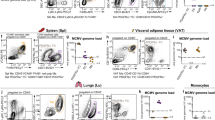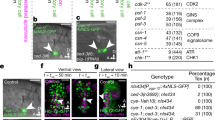Abstract
We report here a study of the mechanisms leading to loss of growth control in chicken embryo fibroblasts transformed by Rous sarcoma virus (RSV). We have been particularly concerned with the role of the src gene in this process, and have used RSV mutants temperature sensitive (ts) for transformation to investigate the nature of the growth regulatory lesion. The two principal findings were (1) the stationary phase of the cell cycle (G1) in chick embryo fibroblasts seems to have two distinct regulatory compartments (using the terminology of Brooks et al.1 we refer to these as ‘Q’ and ‘A’ states). When rendered stationary at 41.5 °C by serum deprivation, normal cells enter a Q state, but cells infected with the ts-mutant occupy an A state. (2) Whereas normal cells can occupy either state depending on culture conditions, the ts-infected cells, at 41.5 °C, do not seem to enter Q even though a known src gene product, a kinase, is reported to be inactive at this temperature2,3. We discuss the possibility that viral factors other than the active src protein kinase influence growth control in infected cultures.
This is a preview of subscription content, access via your institution
Access options
Subscribe to this journal
Receive 51 print issues and online access
$199.00 per year
only $3.90 per issue
Buy this article
- Purchase on Springer Link
- Instant access to full article PDF
Prices may be subject to local taxes which are calculated during checkout
Similar content being viewed by others
References
Brooks, R. F., Bennett, D. C. & Smith, J. A. Cell 19, 493–504 (1980).
Collet, M. S. & Erikson, R. L. Proc. natn. Acad. Sci. U.S.A. 75, 2021–2014 (1978).
Rübsamen, H., Friis, R. R. & Bauer, H. Proc. natn. Acad. Sci. U.S.A. 76, 967–971 (1979).
Bell, J. G., Wyke, J. A. & Macpherson, I. A. J. gen. Virol. 27, 127–134 (1975).
Sefton, B. M., Hunter, T., Beemon, K. & Eckhart, W. Cell (in the press).
Parry, G. & Hawkes, S. P. Proc. natn. Acad. Sci. U.S.A. 75, 3703–3707 (1978).
Bissell, M. J., Hatie, C. & Calvin, M. Proc. natn. Acad. Sci. U.S.A. 76, 348–352 (1979).
Calothy, G., Doirier, F., Dambrine, G. & Pessac, B. Virology 89, 75–84 (1978).
Poste, G. & Flood, M. K. Cell 17, 789–800 (1979).
Harley, J. B. & Goldfine, H. Expl Cell Res. 118, 47–54 (1979).
Teng, M., Bartholomew, J. C. & Bissell, M. J. Nature 268, 739–741 (1977).
Bartholomew, J. C., Pearlman, A. L., Landolph, J. R. & Straub, K. Cancer Res. 39, 2538–2543 (1979).
Author information
Authors and Affiliations
Rights and permissions
About this article
Cite this article
Parry, G., Bartholomew, J. & Bissell, M. Role of src gene in growth regulation of Rous sarcoma virus-infected chicken embryo fibroblasts. Nature 288, 720–722 (1980). https://doi.org/10.1038/288720a0
Received:
Accepted:
Issue Date:
DOI: https://doi.org/10.1038/288720a0
This article is cited by
Comments
By submitting a comment you agree to abide by our Terms and Community Guidelines. If you find something abusive or that does not comply with our terms or guidelines please flag it as inappropriate.



